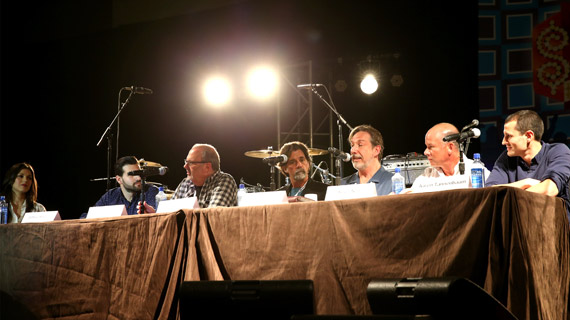

Pictured (L-R): Host Virginia Davis, Jeffrey Hasson, Adam Kornfeld, Steve Lassiter, Paul Lohr, Kevin Neal, Aaron Tannenbaum. Photo: Terry Wyatt/Getty Images for IEBA
The 2014 IEBA (International Entertainment Buyers Association) is in full swing at Nashville’s Omni Hotel. The four-day seminar kicked off Saturday (Sept. 27) and concludes after the Honors and Awards Ceremony at the CMA Theater on Tuesday.
In the words of panelist Jeffrey Hasson (Paradigm), Monday’s Agents Power Panel centered “the most lucrative part of an artist’s career.” Joining Hasson was Adam Kornfeld (Artist Group International), Steve Lassiter (APA), Paul Lohr (New Frontier), Kevin Neal (WME), and Aaron Tannenbaum (CAA).
Neal, who left BLA for his current post in May, noted there is a bulk of resources that are now available to his clients. “Jason Aldean has already had a movie and book offer in four months. Those are things that I couldn’t have [previously] brought to the table.”
To that point, Lassiter remarked of his “small-large agency is a full-service agency, so we do have branding, licensing, television and film.” He expressed of the difficulties in getting lost in the various services of a larger agency, where he had spent 13-years.
Developing artists have moved from busses, prevalent in the 80s-90s, to vans, noted Neal. “Clare Dunn played two dates in Chicago with Randy Houser last week for $500 a piece,” he said. “She lost money, but that’s just a stepping stone. At WME it’s great to have a pool to develop artists through touring. It’s exciting to see artists grow through those ranks and fun to put artists in places to develop.”
Managing expectations between agents, artists, management and label is the No. 1 necessity for CAA’S Tannenbaum. “The second thing you need is for an artist and manager to be willing to play for what they’re worth – allowing the promoter to win. Having said that, there’s an enormous amount of value in young artists getting their sea legs at fairs and festivals.”
“You also have to ask what [the opportunity is] setting you up to do next time,” contributed Hasson to the development discussion. “As a team we’re trying to figure out how to make a show close stronger.” To that end, Lassiter noted, “If everything is lined up, it comes down to an artist fans want to see.”
“There are 30 other shows that month at the same club,” warned Kornfeld of depending fully on the promoter. “Management needs to help them get over the hump with outside promotional and creative ideas.”
Lohr discussed gaining “slow and steady” traction without radio airplay with the Avett Brothers. “We hit the suburbs before playing downtown. We didn’t do a lot of free events, and I think that helped because we had a passionate fan base. If you put an artist in front of a crowd prematurely, they’re only as popular as the chicken and waffles.”
Agents battle routing in an oversaturating market, noted Tannenbaum. “It’s a land grab out there. In Country, we try to stay a month away from each other, but we’re reaching a critical mass.” To which Neal replied, “You can’t parachute in on top of each other. There is only so much money in the market.”
“One of the biggest differences with rock, is that there are so many different genres,” suggested Kornfeld of the New York-based Artist Group International. “Our agency could have Billy Joel one night, Metallica, Lincoln Park, it doesn’t matter. The audiences aren’t the same. It’s too bad in Country there aren’t more genres to prevent from cannibalizing the whole audience.”

Category: Featured, Organizations, Touring
About the Author
Eric T. Parker oversees operations and contributes editorial for MusicRow's print magazine, MusicRow.com, the RowFax tip sheet and the MusicRow CountryBreakout chart. He also facilitates annual events for the enterprise, including MusicRow Awards, CountryBreakout Awards and the Rising Women on the Row. eparker@musicrow.com | @EricTParkerView Author Profile


